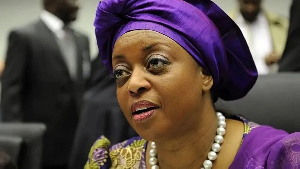Mounting pressure from the United States Dollar on the Ghana Cedi has resulted in a growing shortage of the US currency on the market. As at last Friday, the Cedi had fallen by 9.22 percent and 6.46 percent to the Dollar and Pound since the year began but had inched up by one percent and 0.97 percent to the Euro and the CFA respectively.
Investigation has revealed that the US dollar which the local currency is pegged to and thus all transactions are done in, has almost vanished in the financial sector.
Similarly, the Pound Sterling which is also one of the most powerful currencies in the world is becoming limited in supply. A visibly disturbed businesswoman who had entered the banking hall of the Corporate Business Office of one of the leading indigenous banks in the country last Thursday was shocked to be told that there was no British Pound Sterling to be bought. The woman who wanted to buy £100 had to return home empty handed.
Another woman, a popular figure in this country, was also dismayed when she was told to come back the following day for her $1000 as there was none available for her last Thursday. On her return to the same place on Friday, she was told to wait for the Branch Manager as there was no dollar currency available despite the banks assertions the previous day. The woman was so upset that she told this paper that the present situation needs an immediate intervention by government to avert any economic difficulty.
Checks at some banks in the country also revealed shortages of the two currencies in the system.
Though customers or businessmen and women could get some dollar and pound sterling to buy from the banks, they may not get the quantities they desire. A visit by the paper to several forex bureaus also revealed similar trends with inadequate dollars and pounds in circulation. Since the beginning of the year, the Ghana cedi had been depreciating at a rapid pace, declining by over seven percent to the US dollar and over 6 percent to the pound sterling. Though it had maintained some resilience against the Euro and the CFA, it has recently witnessed some dip in the year-to-date.
It will be recalled that this paper reported recently about capital flight scare hitting the nation. The paper indicated that the low performance of the Ghana Stock Exchange (GSE) was mounting pressure on some foreign investors in the country to relocate their capitals to other countries. Lack of confidence in the country with the report of the economy being broke is also believed to have triggered the capital flight phenomenon. The apprehension of the cedi fall appears to have also triggered the situation whereby people are chasing the foreign currency to buy and then keep it for future gains.
Rev. Ogbamey Tetteh, Head of Research at Databank had earlier told this paper that the Ghana Cedi’s stability would require tight fiscal and monetary policies. And with the Monetary Policy Committee of the Bank of Ghana meeting, analysts and market watchers will be anxiously waiting for a policy that will help bring strength to the local currency.Meanwhile the cedi dropped again against the dollar last Friday but inched up against the other major foreign currencies. It lost 30GHp to the dollar and gained GH¢1.70, 8GHp and GHp2 against the pound, euro and CFA.
Business News of Tuesday, 24 February 2009
Source: .
















